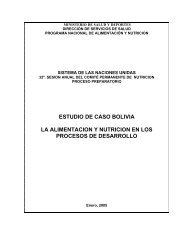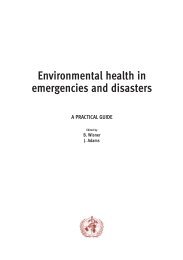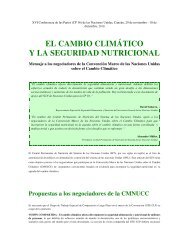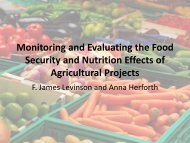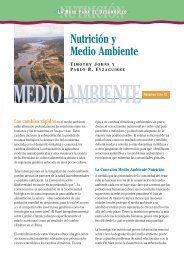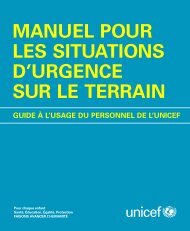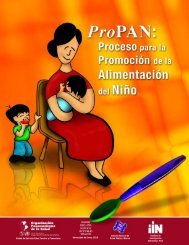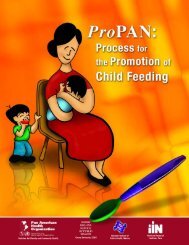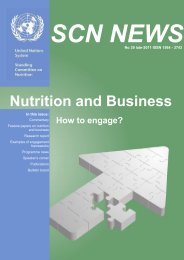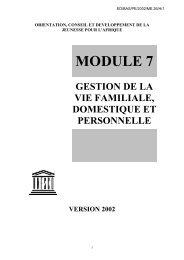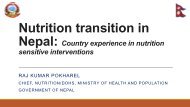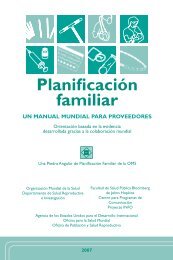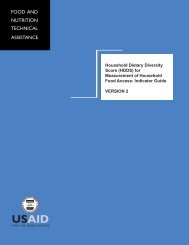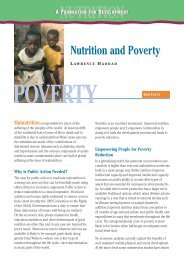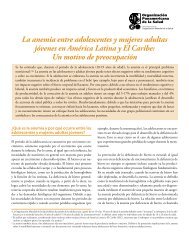SCN News No 36 - UNSCN
SCN News No 36 - UNSCN
SCN News No 36 - UNSCN
Create successful ePaper yourself
Turn your PDF publications into a flip-book with our unique Google optimized e-Paper software.
The Symposium papers presented at the 35 th Session include two covering the main findings and recommendations<br />
from the LNS together with three other papers that comment on them and place them in a national and<br />
programmatic context. These five papers are extremely complementary, and I recommend you to read all of them<br />
together, rather than any one of them alone. The presenters of the LNS papers, Mercedes de Onis (p.12) and<br />
Robert Black (p.17), described the enormity of the maternal and child undernutrition problem, as well as the negative<br />
life course consequences in store for those that survive. They also described the evidence base for discreet<br />
interventions that operate at the immediate level of causality and that are proven to work, as well as how or<br />
whether the proven interventions are being implemented "at scale" in countries most affected, and the adequacy of<br />
the international nutrition institutions to guide and facilitate country level implementation. The first contextual<br />
paper, by Marie Ruel (p.21), emphasized the need for multisectoral approaches involving ministries of agriculture<br />
and health, and presented plausibility based evidence of programmatic approaches, operating at the more distal<br />
household and community level of causality, to improve food intake and care dimensions of the nutrition<br />
problematic, and that are needed in addition to the LNS package of interventions. Dr Khan (p.30) presented an<br />
ambitious proposal to accelerate the reduction of stunting in Vietnam that contemplates all of these levels of<br />
causality and proposes to adapt the package of interventions to suit sub-national variations in conditions. The last<br />
contextual paper, by David Pelletier (p.38) looks at the various factors (positive and negative) that have helped<br />
and/or stopped the nutrition agenda from moving forward at the country level, in order to allow effective<br />
programmes to be set up and operate at scale to accelerate the reduction of maternal and child undernutrition. In<br />
Hanoi, many of the <strong>SCN</strong> Working Groups discussed the implications of the LNS in their respective thematic areas<br />
(p.57). We also publish a commentary by André Briend et al on management of severe acute malnutrition (p. 63).<br />
To celebrate the 30 th Anniversary of the <strong>SCN</strong>, Alan Berg, one of the founder members of the <strong>SCN</strong>, was invited to<br />
give the 12 th Dr Abraham Horwitz lecture at the Session in Hanoi (p.44). Alan presented the results of a survey of<br />
nutrition practitioners across the globe, researched through the <strong>SCN</strong> mailing list. The same questions were used<br />
as those used in a survey Alan did back in the early seventies, the results of which formed the basis of his famous<br />
book entitled the "Nutrition Factor" (Berg 1973). Comparing the results of the two surveys across the thirty years of<br />
the <strong>SCN</strong>'s existence provided some interesting and encouraging findings, which Alan presented at the end of the<br />
Session Symposium. Taking advantage of the occasion the <strong>SCN</strong> presented Awards of Honour to Alan Berg and to<br />
Michael Latham in recognition of their life time contributions to international nutrition. Awards were also presented<br />
to Professors Khoi and Tsai, the founding fathers of nutrition science in Vietnam, both for their remarkable life time<br />
contributions to nutrition science, which have undoubtedly laid the foundation for the remarkable progress towards<br />
the MDGs that Vietnam has made (<strong>SCN</strong> 2008a, 2008b).<br />
The overall balance of results achieved at the 35 th Session is a remarkably positive one. The recommendations from<br />
the Session are potentially very useful for practitioners at the country level that have the hardest task i.e that of putting<br />
nutrition science into practice as successful programmes acting at scale. There were some low points in the<br />
Session proceedings however, with the usual tensions surfacing that seem to mark discussions among the practitiowww.unsystem.org/scn<br />
1<br />
Secretary’s Round-Up<br />
This edition of the <strong>SCN</strong> <strong>News</strong> is of special relevance for a variety of reasons, not least of which being the<br />
recommendations agreed at the 35 th Session (p.51) held in Hanoi in March 2008, hosted by the Government of<br />
Vietnam (<strong>SCN</strong> 2008a). The 35 th Session was aimed at understanding how to accelerate the reduction of maternal<br />
and child undernutrition, drawing on the recently launched Lancet Nutrition Series (LNS) on maternal and child<br />
undernutrition (Maternal and Child Undernutrition Study Group 2008). The papers presented in Hanoi are featured<br />
here, together with the recommendations concerning actions needed to accelerate the reduction of maternal and<br />
child undernutrition. The recommendations draw on the presentations and discussions in the Symposium, as well<br />
the inputs of the <strong>SCN</strong> Working Groups, also included in this edition (p.57), and have been further elaborated on and<br />
agreed to by all three constituencies of the <strong>SCN</strong>. The recommendations have become of even greater relevance<br />
because of the soaring food prices crisis, that broke almost immediately after the 35 th Session had finished.<br />
In their welcoming speeches at the opening of the Session the <strong>SCN</strong> Chair Ann M. Veneman (p.4) and the Standing<br />
Deputy Minister of Vietnam H.E. Nguyen Sinh Hung (p.7) recognized the multisectoral nature of malnutrition and<br />
emphasized the urgency to address the high rates with multiple strategies. In his keynote speech, the Minister of<br />
Social Development and Fight against Hunger of Brazil Patrus Ananias further emphasized a rights-based approach<br />
and shared experiences of the "Zero Hunger" programme from Brazil (p.8).<br />
back to contents <strong>SCN</strong> NEWS # <strong>36</strong>



